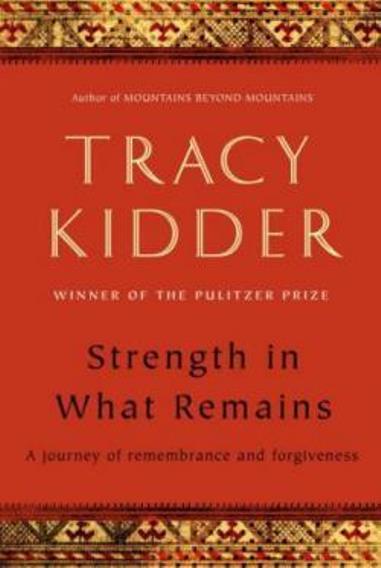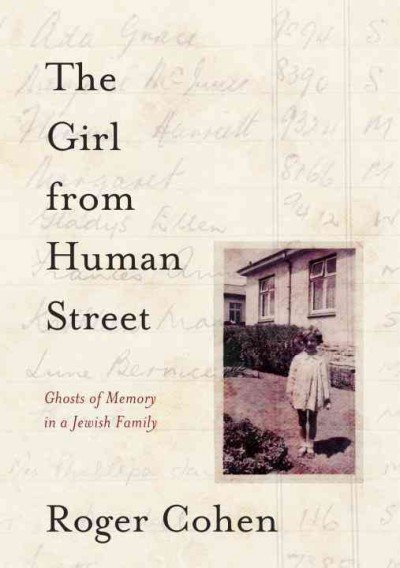|
I associate Roger Cohen with his skateboarding on a small ottoman, at risk of a broken neck, to celebrate a Chelsea goal on the tube.
I associate Tracy Kidder with his long legs racing around the bases on a softball party, decades ago. Yes, serious writers, have their sports side. I just caught up with books by both of them, touching the deepest issues in the world – genocide, inequity, identity. Cohen’s book is “The Girl from Human Street: Ghosts of Memory in a Jewish Family,” published this year by Alfred A, Knopf. It is partially about the imbalance in many members of his family, which has made the trek from Lithuania to South Africa and onward. His mother became troubled shortly after emigrating from South Africa to England early in her marriage and never recovered. The book also delves into what it means to be Jewish in a dangerous world, with some of his family escaping ahead of the murders in Europe, making a success in South Africa, but never feeling quite accepted in England – hearing the discreet lowering of voices and being described as “Jew” rather than “Jewish.” Later Cohen re-settled, for reasons he came to understand. “One day, banking over New York City on the approach to LaGuardia, watching the serried towers of midtown, a single word welled up from deep inside me: home.” Cohen writes of the city of “incomers.” He has become one of journalism’s most staunch defenders of the marginal. Tracy Kidder has also been exploring corners of the world, ranging from the emerging computer society to poverty in Haiti, often seeking people who take chances, who make a difference. His idealism is on display in his 2009 book for Random House, “Strength in What Remains: A Journey of Remembrance and Forgiveness.” Kidder traces the wandering of a people, and an individual, Deogratias Niyizonkiza, a member of the Tutsi tribe in Burundi. Barely escaping a bloodbath while in medical school, Deo survives in Africa the same way some of Cohen’s family survived in Europe – through the grace and courage of others. In Kidder’s book, the man called Deo lands in New York, is helped by a baggage handler named Muhammad, a former nun, and an intellectual couple from Greenwich Village – the parallel layers of strength that work so often in this city. Kidder recreates Deo’s survival in Burundi, and moves toward the present, with Deo, now a poised 40-something New Yorker, running a medical facility back home in Burundi, where the prevailing custom is to not remember terrible things that have happened. My conclusion is that there is no such thing as light summer reading. These books by Cohen and Kidder would make me think and care in any season.
Sam Toperoff
9/1/2015 11:21:43 pm
Wonderful books, both of them. Wonderful human beings, both of them. And reason, George, as you often remind, not to lose heart, but to fight the honorable fight in a very dishonorable world. Let me also add Oliver Sacks to your short list. And of course, Oliver Sacks, who in his recent memoir gave us: "Above all I have been a sentient being, a thinking animal on this beautiful planet, and that in itself has been an enormous privilege and adventure." Where the Mets figure in all this, I still can't figure!
George Vecsey
9/2/2015 01:28:22 am
Sam, merci beaucoup for noting Oliver Sacks. Marianne, who as you know is far more knowledgeable about science and philosophy than I am, adores Sacks and we have been talking about him for months, since his announcement. I once read that he had the same meal every day -- chicken, potatoes and peas. But then I read that when left to his own devices he had cereal or sardines, in 30 seconds. And he swam! And lifted weights! I studied a photo of him in middle age -- major muscles on his arms. And he rode a motorcycle. And was very handsome in his youth. And he wrote a bit. He had a flat in the same building as a friend of ours in the Village, and I always hallucinated about spotting him, but it never happened. So to get back to the theme here, yes, I felt I knew him.
Brian Savin
9/2/2015 02:22:14 pm
As is your wont, George, your seemingly straightforward observations are anything but. You demand serious reflection. OK, here's what you are saying, to me: Do these different but similar books mark the true globalization of our species so that we can read of suffering anywhere to anyone and take it personally? Or, are we still a tribal species that, like all the territorial animals, care only about their immediate own and their required territory for survival and can easily disassociate? President Truman said on a now disappeared newsreel "None of our boys!" when asked if he were concerned about the suffering caused by the atom bomb. I suspect wars wouldn't happen, or at least no one would show up, if we were a truly globalized species; the family of man and woman. Evolution has a ways to go. Maybe I'm wrong.
George Vecsey
9/3/2015 12:45:14 am
Brian, there are traces of universal recognition in both books. 9/5/2015 09:45:38 pm
George, 10/24/2015 09:16:36 am
These books are exploring corners of the world. We will come to know the condition of different people around the world so thank you. Comments are closed.
|
Categories
All
|











